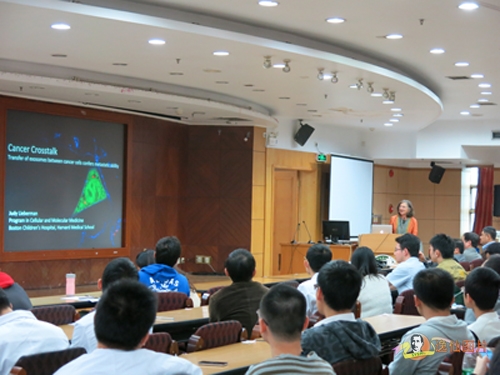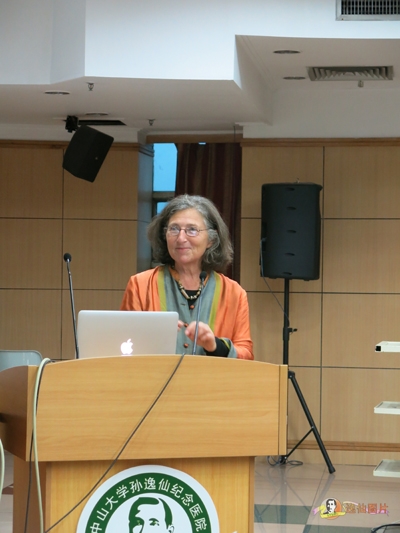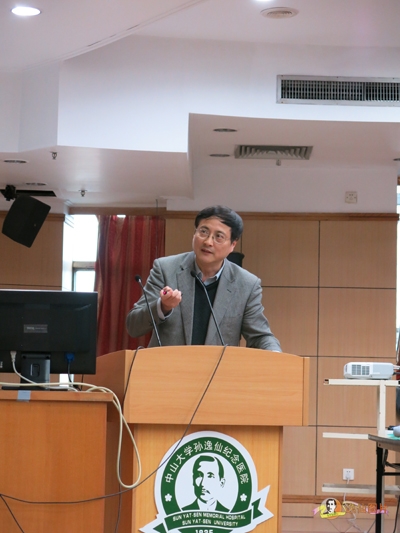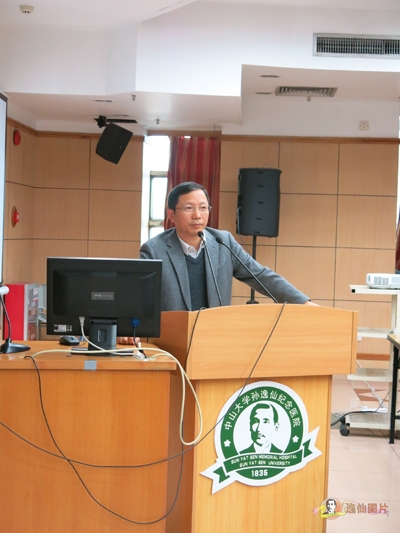SYSH Hosts the First International Tumor Microenvironment Symposium to Promote Academic Exchanges
On November 10, the First International Tumor Microenvironment Symposium was held at the Haizhu Hall of Sun Yat-sen Memorial Hospital(SYSH), Sun Yat-sen University. Professor Judy Lieberman from Harvard University, Professor Lun-Quan Sun from Central South University and Professor Mu-Sheng Zeng from Sun Yat-sen University Cancer Center were invited to share their recent progress on tumor microenviroment at the seminar. Professor Erwei Song, Vice President of SYSH, and Professor Qiang Liu, Director of SYSH International Office, are the hosts for the event.

Professor Mu-Sheng Zeng first delivered a speech of "Cellular factors in EBV infection of epithelial cells", during which he explored the EBV infection mechanism from a cellular perspective. Then, Professor Lun-Quan Sun gave a report of "EBV encoded non-coding RNAs trigger inflammation and promote nasopharyngeal carcinoma development via TLR3-LMP1 pathways", where he implied the importance of regulating EBV encoded non-coding RNAs in the battle against nasopharyngeal carcinoma. Lastly, Professor Judy Lieberman presented her studies on "RNA Cancer Crosstalk: miRNA transfer by exosomes between breast cancer cells confers metastatic capability" by analyzing the relationship between miRNA and breast cancer cells.
The symposium attracted about 200 audiences from Sun Yat-sen university, including professors, young doctors and medical students. During the interaction session, both the speakers and the audiences took the opportunity to further discuss topics of joint interests. By gathering top experts in the field of cancer research, the tumor microenvironment symposium allowed our faculty and students to explore feasible scientific projects with professors from world-renowned universities, which greatly promotes the campus’s academic development and encourages international collaboration.
[Links]

Professor Judy Lieberman is Chair of the Program in Cellular and Molecular Medicine at Boston Children’s Hospital and Professor of Pediatrics at Harvard Medical School. She does research on how cytotoxic T cells destroy cells marked for immune elimination, HIV immunology, and how microRNAs regulate cell differentiation and cancer. She was the first to show that RNA interference could be harnessed to treat disease in an animal and is actively developing RNAi-based therapeutics for viral infection and cancer. She is a member of the American Academy of Arts and Sciences.

Professor Lun-Quan Sun is Director of Centre for Molecular Medicine, Central South University. He was recruited as full-time professor from University of Technology, Sydney, in 2009 and has been actively working in the areas of cancer signal transduction, oncoviruses, therapeutic resistance of cancer, and nucleic acid-based therapeutic approaches to cancer and viral infection. He published extensively in both high impact journals and specialized journals including Nature Biotech, Nature Med, PNAS, Oncogene, JBC etc, and served in various professional panels and committees both in China and internationally.

Professor Mu-Sheng Zeng is Professor of Experimental Research and Vice President of the General Affairs Department at Sun Yat-sen University Cancer Center. He finished his Postdoc studies in Biology at Tennessee State University, USA, in 2000 and continued to study in Tumor Biology at New England Medical Center, Tufts, until 2003. He is the Principal Investigator of Tumor Virology and Cellular Tumor Markers at State Key Laboratory of Oncology in South China. His laboratory has been engaged in the Pathogenesis and Etiology of Nasopharyngeal Carcinoma (NPC), and they are currently interested in the mechanism of EBV infection and transformation of nasopharyngeal epithelial cells.


